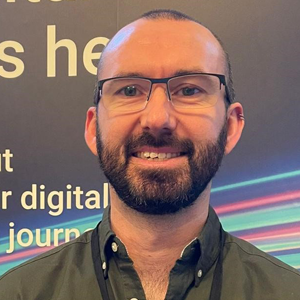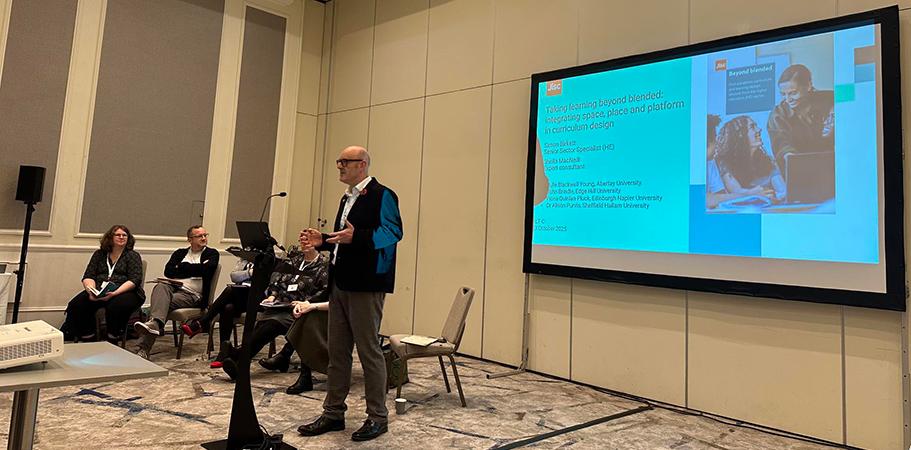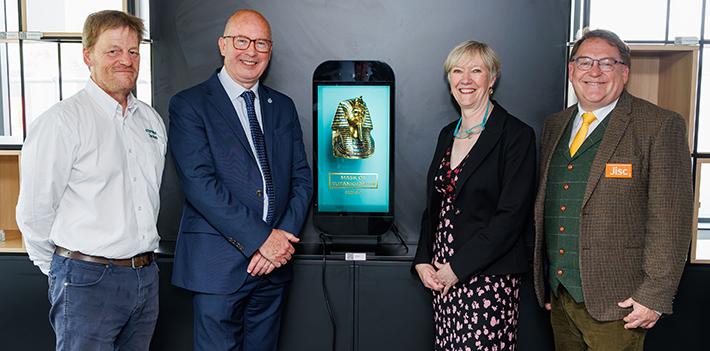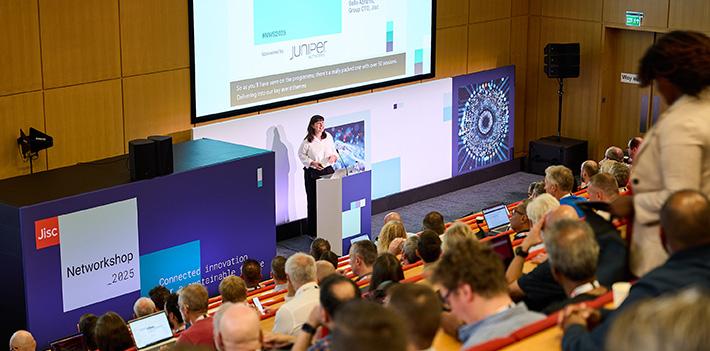Blog
Security Conference – building resilience and sharing powerful lessons to strengthen our sector
Our head of cyber engineering and architecture reflects on this year’s conference and some of its key takeaways.

 byBen Chapman
byBen ChapmanPostgraduate recruitment and the rise of regional collaboration
Universities are exploring new ways to collaborate on postgraduate recruitment. We look at the opportunities, risks and how our Discover progression undergraduate to postgraduate dashboards provide the evidence to guide decisions.

 byScotty Dixon
byScotty DixonDigital sustainability: small choices, big impact
Exploring how practical, evidence-based actions can reduce the hidden environmental impact of digital technology and build a sustainable digital culture in education.

 byCal Innes
byCal InnesWhy trusted research environments should be at the centre of digital strategies to fuel innovation, sustainability and growth
Insights from a Jisc-hosted forum on advancing strategic approaches to trusted research environment (TRE) ecosystems reveal why collaboration and governance are key to making TREs a core part of institutional digital strategies.

 byVictoria Moody
byVictoria MoodyALTC25: building stronger foundations for inclusive, innovative learning
Reflections from Jisc expert-led sessions at ALTC25, sharing insights, tools and frameworks to help you navigate complexity and drive innovation in learning.



 bySimon BirkettandKathryn WoodheadandCat Bailey
bySimon BirkettandKathryn WoodheadandCat BaileyConnect More: a journey of connection, creativity and change
Connect More returns this December to explore how digital tools and approaches can enhance teaching, learning, and student support.

 byJason Miles-Campbell
byJason Miles-CampbellReducing vulnerability through strategic software asset management
Strategic asset management empowers institutions to gain control, strengthen security, and make informed decisions for long-term value.

 bySonia Davies
bySonia DaviesSecurity Conference 2025: why it’s time to act on tackling cyber threats
Cyber threats demand UK education and research institutions build resilience, enforce governance, and respond swiftly to protect students, assets, and operations.

 byDavid Batho
byDavid BathoUnderstanding postgraduate progression: why data matters more than ever
With domestic enrolments falling and competition rising, data-driven insight is key to postgraduate recruitment.

 byScotty Dixon
byScotty DixonWhat the R14 scramble tells us about data maturity
The R14 deadline exposes deeper issues in data culture and maturity across further education providers. Here’s why it’s time to take stock.

 byAndy Simm
byAndy SimmTransforming curriculum and learning design in a shifting landscape
Blended learning is now core to the higher education offering but how well is it serving our students and staff?

 bySarah Knight
bySarah KnightFrom league tables to life chances: why continuation matters more than ever
Improving continuation is complex, but essential. With the right data and analytics, leaders can improve rankings, reduce financial losses, and, most importantly, help more students succeed.

 byJames Hodgkin
byJames HodgkinShaping our priorities for Wales – key takeaways from our Welsh engagement forum
Our annual Welsh engagement forum brought together education leaders to discuss sector priorities, including AI, cost pressures, bilingual provision and collaboration, directly shaping our strategic plans for Wales.

 byRhys Daniels
byRhys DanielsFrom data to inclusion: how Jisc supports Scotland’s innovation journey
Find out how we empower Scotland’s colleges and universities to drive inclusive, data-driven and technology-enabled innovation in teaching, learning and research.

 byJason Miles-Campbell
byJason Miles-CampbellWhat students really think about their digital experience in higher education
Our newly published digital experience insights survey not only highlights areas of progress, but also points to where future investment is most needed and provides robust evidence for future initiatives.

 byDominic Walker
byDominic WalkerMeeting the new international student compliance rules with learning analytics
The basic compliance assessment (BCA) threshold for international students is increasing. Learning analytics could be the key for universities achieving the higher completion rates and staying compliant.

 byJames Hodgkin
byJames HodgkinSetting the foundations for successful collaboration
Collaboration between higher education institutions can save money, increase productivity and lead to better student experiences.

 byJames Clay
byJames ClayIt’s better together – how to make the case for collaboration
Convincingly making the case for collaboration across the higher education sector for better student experiences is crucial, but how do you get key people on board for institutional and personal buy-in?

 byJames Clay
byJames ClayWhat's next after the UKRI monographs policy roll out?
We've worked intensively on a special project to support publishers, institutions, and authors with the launch of UKRI's policy. Now we look ahead to what still needs collective action.

 byAnna Vernon
byAnna VernonHow Jisc helped implement UKRI’s open access policy for research articles – and what’s next
Our strategic support for implementing UKRI’s open access policy includes negotiations with 416 publishers, cost-saving measures, and future plans for sustainable open research models.

 byAnna Vernon
byAnna VernonGraduate Outcomes in context reveals a resilient graduate labour market
Newly released survey results paint a wider picture of the way the graduate labour market looks today.

 byCharlie Ball
byCharlie BallNetworkshop – a valuable opportunity to learn about the opportunities and threats faced by our community
A personal view from Bella Abrams, Jisc's chief technology officer, on the recent event for IT leaders held at Nottingham Trent University and online.

 byBella Abrams
byBella AbramsTNC25 – underlining the spirit of global collaboration and sharing
National Research and Education Network (NREN) specialists from more than 70 countries gathered in Brighton, UK, to share expertise at the GÉANT TNC25 conference. It was Jisc’s privilege to host the event.

 byDavid Patterson
byDavid PattersonEmpowering leadership with a digital mindset: reflections from our HE summit
Digital leadership is uniquely challenging, but it's also deeply human. Here's what I learned during our digital empowered executives: HE leadership summit.

 byHeidi Fraser-Krauss
byHeidi Fraser-KraussGetting the most out of your national research and education network
The Janet Network provides UK HE, FE and research institutions (and increasing numbers of schools and other public sector bodies) with an entire ecosystem of vital connectivity services.

 byNeil Shewry
byNeil ShewryKeep your sanity and stay positive with Dr Estelle King at Networkshop
Ahead of her breakout session at Networkshop 2025, Dr Estelle King shares practical advice and philosophy on how you can stay connected, adaptable and resilient in challenging times.

 byDr Estelle King
byDr Estelle KingNew university spin-out register launched
Jisc launched a first-of-its-kind register to provide information about spin-out firms created by UK universities.



 byVikas DhawanandTlyssa PlesterandDan Cook
byVikas DhawanandTlyssa PlesterandDan CookEverything you want to know about cloud but are too afraid to ask
Cloud computing offers greater flexibility and scalability, and more opportunities for innovation.

 byGeorge Oosthuizen
byGeorge OosthuizenPutting AI into action, with Professor Judy Williams
Professor Judy Williams, pro-vice-chancellor of Queen’s University Belfast, outlines how a positive approach to technological change is delivering game-changing benefits for staff, students and the wider university community.

 byProfessor Judy Williams
byProfessor Judy WilliamsEverything you want to know about cyber but are too afraid to ask
Curious about cyber security but not sure where to start? Explore the answers to the questions you're afraid to ask, with practical tips on staying secure and how Jisc can help.

 bySteve Howard
bySteve HowardFive reasons why the Janet Network is the backbone of connectivity for independent schools
Whether you're reviewing your school's digital setup or just curious about better connectivity, here’s why the Janet Network is becoming a trusted choice for independent schools like yours.

 byGabrielle McEvans
byGabrielle McEvansTailor your organisation’s cyber defences: it’s smarter than relying on an off-the-peg solution
Implementing cloud security solutions without configuring them correctly might mean missing out on features that boost your organisation’s resilience and save on costs.

 byRichard Jackson
byRichard JacksonNext generation open access negotiations at teaching-focused institutions: what matters to us
In preparation for Jisc’s next generation open access (OA) negotiations, UK universities, whether research or teaching-focused, have been reassessing their publishing relationships.


 byJudith CarrandAnna Franca
byJudith CarrandAnna FrancaBerlin 17 and the road to next generation open access
The 17th OA2020 Conference at Harnack House, Berlin, brought together 150 representatives from 40 countries to evaluate global progress toward open access.
 bySarah Roughley Barake
bySarah Roughley BarakeSetting strong foundations: why the basics matter in cyber security
Six good old-fashioned basics underpin the most effective cyber security strategies.

 byBen Chapman
byBen ChapmanHow engagement and collaboration can help us find new opportunities in tertiary education
Personal reflections on Digifest 2025 from Heidi Fraser-Krauss, CEO.

 byHeidi Fraser-Krauss
byHeidi Fraser-KraussWhat's the difference between SIEM, managed SIEM and SOC?
Learn how a security information and event management (SIEM) and a security operations centre (SOC) can enhance your organisation's cyber security posture.

 bySteph Jones
bySteph JonesMaximise your budget and secure better software agreements
How engagement with Jisc’s group negotiation strategies helps you make the most of your budget and ensures software licences match your needs.

 byLuciana Piccoli
byLuciana PiccoliReflections on our sustainability journey
We've published our sustainability report, describing the work we've done over the last year to minimise our impact on the natural environment.

 byClare Casey
byClare CaseyThe future of learning analytics: make data your organisation’s priority
You already have the data. Make the most of it.


 byJames HodgkinandJim Keane
byJames HodgkinandJim KeaneShaping the future: FE and skills workforce development in the age of AI
Dr Vikki Smith, executive director, education and standards at the Education and Training Foundation (ETF) reflects on how the further education (FE) and skills sector must adapt to equip the workforce of today and tomorrow.

 byDr Vikki Smith
byDr Vikki SmithClosing the digital divide: addressing digital poverty in education and beyond
Maxine Room joins us at the Association of Colleagues Conference to discuss digital poverty in education and beyond.

 byMaxine Room
byMaxine RoomAI: five actions for college leaders
Michael Webb, director of AI, shares his insights into the latest AI advancements and outlines five practical steps to help colleges effectively implement AI tools.

 byMichael Webb
byMichael WebbLA Story - successful learning analytics means understanding the data
Ethan Henry and Mimi Weiss share their lessons learned from implementing learning analytics at City University of London.


 byEthan HenryandMimi Weiss Johnson
byEthan HenryandMimi Weiss JohnsonFast, cost-effective connection to the Internet for learners wherever they are
How SD-WAN technology can help meet the challenges of delivering blended learning.

 byGuy Easterbrook
byGuy EasterbrookThe future of assessment: embracing AI and EdTech
To coincide with A-level, T-level and BTEC results day, Olly Newton, executive director at the Edge Foundation shares his thoughts on the future of assessment and how tools such as AI are changing the game.

 byOlly Newton
byOlly NewtonIt's not technology that determines the success of a VLE - it’s the users
The vital questions to ask when embarking on a virtual learning environment (VLE) change at your organisation and why there is no silver bullet.

 byZac Gribble
byZac GribbleImproving cyber security immediately in one easy move – at no extra cost
How institutions can create the most secure environment possible for learning online.

 byBen Chapman
byBen ChapmanBeware the 5th of July – the worst day of the year for a cyber attack
How can universities and colleges keep services running smoothly during critical periods like clearing and enrolment?

 byClare Stonebridge
byClare StonebridgeWhat did NRENs ever do for us? The answer might surprise you
As we announce we'll be hosting TNC 2025 in Brighton, Heidi Fraser-Krauss reflects on the value of the Janet Network to UK research and education.

 byHeidi Fraser-Krauss
byHeidi Fraser-KraussWhat’s keeping FE leaders awake at night?
We asked about their challenges for the coming year – and priorities have changed

 byRobin Ghurbhurun
byRobin GhurbhurunMaximising the investment in research equipment
Creating a single database of available equipment could boost the societal impact of research in the UK.


 byJohn KayeandBalviar Notay
byJohn KayeandBalviar NotayBuild it and they will code
Coding skills have become a coveted asset but the perception persists that it is a domain accessible only to the tech-savvy few.

 byGuy Stevenson
byGuy StevensonIs it time to rethink curriculum and learning design?
The rapid transition to online learning in 2020 has been evaluated, lessons learned, and improvements made. The landscape has changed since then - is it time to pivot and adapt again, taking blended learning to the next level?

 bySarah Knight
bySarah KnightShared threat intelligence is a game-changer for UK education and research
“Together we are stronger” should be everyone’s cyber security mantra.

 byDavid Batho
byDavid BathoEmpowering education through global collaboration at Bradford College
Community champion Seima Mahmood and colleague Monika Worthington have spearheaded a campaign to make digital learning more inclusive and collaborative for ESOL learners at Bradford College
 bySeima MahmoodandMonika Worthington
bySeima MahmoodandMonika WorthingtonHow smaller publishers are adapting and responding to the open access landscape
Small presses offer unique perspectives and wide viewpoints, and should be valued, supported and encouraged.

 byAnna Hughes
byAnna HughesCyber security is not just about the technical
How to persuade senior management to invest in cyber protection, from avoiding acronyms to building a community.

 byDavid Batho
byDavid BathoAmplifying the voice of the further education and skills sector is key to improving software licensing terms
Collaboration between the FES community and Jisc is essential to enhancing our collective ability to drive transparency and fair pricing for the benefit of all

 byLuciana Piccoli
byLuciana PiccoliShining a spotlight on digital poverty
Analysis of the Digital experience insights survey highlights gaps in access to digital learning.


 byClare KillenandDominic Walker
byClare KillenandDominic WalkerThe dos and don’ts of dealing with DDoS attacks
Vigilance and a complete understanding of what DDoS entails are critical to staying protected.


 byClare StonebridgeandBen Crowther
byClare StonebridgeandBen CrowtherOptimising the UK’s digital research infrastructure through the power of community
Reducing research bureaucracy, supporting international collaboration and growing net zero imperatives are all increasingly critical.

 byVictoria Moody
byVictoria MoodyOpen and transparent research is vital, but not easy - and it is reliant on research professionals
Openness and transparency are important components of rigorous and reproducible research and are fundamental to supporting a healthy research and innovation culture.


 byTamsin BurlandandNeil Jacobs
byTamsin BurlandandNeil JacobsExploring AI and assessment – avoid, outrun or embrace
A review of the three main approaches to generative AI in assessment.

 bySue Attewell
bySue AttewellTransforming the learner experience by extending eduroam across the campus and beyond
Simply by opening their laptop, tablet or phone, users can now access online learning – wherever they are.

 byTom Hayman
byTom HaymanThink like a hacker: improve your cyber security
Understanding how threat actors work makes it easier to make their lives more difficult

 byNicole Stewart
byNicole StewartNetworkshop 2024: Building the powerful connections needed to deliver the best learner experience
Explore next generation networking while also contributing to your continued professional development programme.

 byJoy Palmer
byJoy PalmerUK must step up to ensure access to digital learning is ethical, innovative and inclusive
Reflections from the State of the Net conference

 byPaul McKean
byPaul McKeanBecoming anti-racist isn’t always easy or comfortable: but it’s the right thing to do
Outlining Jisc's journey from a non-racist to an actively anti-racist organisation

 byGeorgios Pappas
byGeorgios PappasWhat do students know about AI?
The updated Jisc discovery tool will help them find out.


 byDr Becki VickerstaffandAndrew McFadyen
byDr Becki VickerstaffandAndrew McFadyenUsing UKRI’s open access fund for long-form publications: a guide from Jisc
We’ve created a guide for librarians and research professionals who are applying for UKRI’s OA fund for long-form publications to ensure procedures can be followed with ease.

 byAnna Hughes
byAnna HughesSix ways FE colleges can help learners and teachers thrive in an AI-enabled world
A new set of guiding principles from Jisc and AoC makes it easier for colleges to use AI safely, responsibly and effectively.

 byMichael Webb
byMichael WebbInternational Women’s Day: why STEM education remains male-dominated
Addressing the gender disparity requires a holistic approach, but virtual reality and learning through gameplay have the potential to make learning content more inclusive, accessible and engaging.

 byFiona Steel
byFiona SteelUniversities should test their cyber defences - before someone else does
Academia is the top target for ransomware attacks, but there are practical steps that institutions can take to bolster their cyber security

 byHenry Hughes
byHenry HughesTechnology and lifelong learning can be a lifeline for adult students
This #CollegesWeek2024 we’re celebrating the impact blended and online education has on adult learners looking to upskill and improve their prospects for a better life.

 byPaul McKean
byPaul McKeanMicrosoft translation tools can change teaching forever
Hull College has made learning more accessible and inclusive for over 1000 students in their City of Sanctuary by embedding Microsoft translation tools throughout the classroom and the wider campus.

 byDeborah Millar
byDeborah MillarHow we created an anti-racist curriculum that could transform the future of teaching
Wales’ innovative anti-racist curriculum aims to shape the world positively and break down barriers through the use of digital.

 byYusuf Ibrahim
byYusuf IbrahimAI 2030 – navigating the future of artificial intelligence
As we stand at the crossroads of technological evolution, it is crucial we reflect on our journey so far in order to chart a course for the future.

 byMichael Webb
byMichael WebbLet’s get ‘phygital’ – working out the future of work and education
Our mix of physical and digital workspaces is rudimentary and human skills will be as vital as future tech to making it work.

 byDr Nicola Millard
byDr Nicola MillardWhen it comes to partnership in the Scottish colleges sector, love really is all around
This #LoveScotlandsColleges week we’re highlighting the importance of partnerships to achieve colleges’ ambitions.

 byJason Miles-Campbell
byJason Miles-CampbellData, digital and technology will lead the way in reducing research bureaucracy
Recommendations for Jisc from the independent review of research bureaucracy aim to enhance efficiency and support researchers in their important work.

 byVictoria Moody
byVictoria MoodyImplementing AI with digital wellbeing at its CORE
Basingstoke College of Technology is supporting staff and students in the ethical use of technology, including AI, to augment learning and support staff wellbeing.

 byScott Hayden
byScott HaydenArtificial intelligence (AI) can make learning more inclusive for all
Insights into how using AI in the classroom can make learning more inclusive for students of all abilities.
 byChris Temple-Murray
byChris Temple-Murraye-textbooks and the future of learning, teaching and assessment
The challenges of accessing e-textbooks are well known with cost continuing to be at the top of the list.


 byLibby HomerandGavin Phillips
byLibby HomerandGavin PhillipsUKRI monograph open access policy coming soon: here’s what you need to know
Are you ready for the new UKRI monograph open access policy?

 byAnna Hughes
byAnna HughesWelcome to a new age of digital enlightenment
Artificial intelligence takes the spotlight at this year’s Association of Colleges conference.

 byRobin Ghurbhurun
byRobin GhurbhurunUniversity staff are in the digital transformation driving seat, and they need better directions
Digital transformation stands to improve higher education for everyone - here’s why it’s so important to listen to the staff implementing it.

 byKathryn Heywood
byKathryn HeywoodElevating the FE and skills sector through digital transformation
The further education and skills strategy review outlines Jisc's key achievements in supporting the sector on it's digital transformation journey.

 byRobin Ghurbhurun
byRobin GhurbhurunWhy should libraries publish AI-ready collections?
From universities to commerce, law and entertainment, AI is already starting to revolutionise the world around us, and libraries and research are no exception.

 byPeter Findlay
byPeter FindlayMetaversity challenge: How can edtech help higher education leaders overcome their biggest obstacles?
A report with Emerge Education has found higher education leaders are juggling staying updated with cutting-edge trends while addressing urgent sector challenges.

 byNic Newman
byNic Newman'Cyber security: the task is significant and complex, but we are not alone’
Written by Universities UK (UUK) in association with the National Cyber Security Centre (NCSC) and Jisc, new guidance for the higher education sector demonstrates the criticality of cyber security.

 byProfessor Paul Boyle
byProfessor Paul BoyleWithout intervention, AI could widen the digital divide for students
Access to education is a basic human right for all.

 byPaul McKean
byPaul McKeanIt’s never too late to learn about AI and how it can improve education
First steps in AI: how Jisc is helping colleges and universities start their journey on the right foot.

 bySue Attewell
bySue AttewellHow is Jisc supporting universities to make digital transformation achievable?
While it’s true that all universities are transforming digitally, the process is far from uniform.

 bySarah Knight
bySarah KnightCreating a learner's digital passport to better wellbeing
Schools and colleges gather plenty of data about individual learners' wellbeing, but it is often lost when they move to higher education, impacting a university's ability to provide wellbeing support.


 byRobin GhurbhurunandLiam Earney
byRobin GhurbhurunandLiam EarneyInstitutions have the tools needed for sustainable change: the key is turning ideas into strategy
Environmental sustainability as a concept is not new. Colleges and universities have long considered how to minimise waste and make practices more efficient, not only for the good of the planet, but also to reduce costs.

 byCal Innes
byCal InnesResearch’s AI future is nearly here – are we ready?
The AI revolution is about to hit the research sector at scale. As we begin to explore the possibilities of AI in research and research management, it’s Jisc’s role to work with members, funders and stakeholders to develop ethical and practical ways of adapting it.

 byVictoria Moody
byVictoria MoodyWe need to reset the balance between the quality of research and impact storytelling
Problems outlined by a recent government report could be tackled by changing one element of research assessment.

 byDr Alex Freeman
byDr Alex FreemanDoes online learning deter university applicants?
Prospects has surveyed 2,000 UK university students to find out what they think about different modes of study. The results might be a little unexpected, but what can we learn from them?

 byChris Rea
byChris ReaUse one platform as your bridge to data maturity
Using a single data platform can create wide-ranging efficiencies for providers looking to build learning analytics into their organisational culture.

 byJames Hodgkin
byJames HodgkinNew UKRI monographs policy is evolution, not revolution, of OA landscape
Monographs policy aims to boost longer forms of research

 byCaren Milloy
byCaren MilloyOn the edge: how a new approach to data handling can enhance teaching and learning
Why edge computing is a critical element in digital transformation for education and research

 bySimon Farr
bySimon FarrGood, Better, Best – how small steps can drive higher education analytics success
Data analytics offer a way for providers to track and improve key metrics whilst supporting students, but how can they build an analytics culture?

 byJim Keane
byJim KeaneI love my job: pen testers are like the rock stars of IT!
It’s up to us to find weaknesses in systems before the bad actors do. Our work helps members to build better defences against cyber-attacks.

 byAlex Postbechild
byAlex PostbechildThe Janet Network: delivering mission-critical services for UK education and research
An in-depth look at how Jisc provides the power to connect, collaborate and improve the student experience.

 byNeil Shewry
byNeil Shewry‘Jisc can play an instrumental role in making the technology sector a place women want to work’
How Jisc is using gender pay gap data to help encourage more women into technology roles

 byHeidi Fraser-Krauss
byHeidi Fraser-KraussLaying the foundations for an intelligent campus
How universities and colleges can plan for the campus of the future.

 byJames Clay
byJames ClayNew automated cyber service from Jisc takes the heavy lifting out of threat monitoring
As criminals find new ways of infiltrating and disrupting networks and stealing data, cyber security has become an ever-more complicated and time-consuming problem.

 bySteve Howard
bySteve HowardHow Jisc drives innovation: turning great ideas into reality
Helping the education and research sector leverage technology as a force for good.

 bySimon Farr
bySimon FarrThe sky’s the limit: extending connectivity for learning across the campus and beyond
How eduroam can increase accessibility, reduce IT workload and help close the digital equity gap.

 byTom Hayman
byTom HaymanFirst steps towards a smarter campus and healthier buildings
How institutions can improve learning environments while cutting their carbon footprint.

 byVictoria Atherstone
byVictoria AtherstoneTechnology is fundamental to success of Government’s vision for lifelong learning
Last week, the Department for Education (DfE) announced the details of its response to the consultation on the design of the new Lifelong Loan Entitlement (LLE), due to come into effect in 2025.

 byHeidi Fraser-Krauss
byHeidi Fraser-KraussWhy campuses need 5G
The power and speed of 5G open the door to new ways of teaching and learning.

 bySimon Farr
bySimon FarrEvery teacher can be an innovator, so let’s talk about digital confidence
During the pandemic lockdowns, thanks to remote teaching, everyone became an innovator - but many did not realise it.


 byRachel BancroftandRosemary Pearce
byRachel BancroftandRosemary PearceWhy digital soft skills are crucial to graduate success and HE digital transformation
Jisc higher education senior consultant Dr Becki Vickerstaff describes how higher education providers can prepare students more effectively for the workplace by focusing on broader digital skillsets.

 byDr Becki Vickerstaff
byDr Becki VickerstaffHow learning analytics can finally deliver on its promise
James Hodgkin, Jisc’s head of learning analytics, believes understanding data is more than a dashboard: it can improve data governance across higher education.

 byJames Hodgkin
byJames HodgkinWhy university leaders need to know their digital
We are seeing different approaches to tackling digital transformation, and it’s inspiring to read such a vast array of examples from around the sector in our latest report.

 byLiam Earney
byLiam EarneyInnovation in education – there's much to love about Scotland's colleges
From the excitement of cutting-edge industrial simulations to helping single parents reskill for a new job, our colleges continue to innovate, providing workforce and industry support for Scotland’s future.

 byJason Miles-Campbell
byJason Miles-CampbellIndustry and education must work together to boost digital skills
What are the digital skills employers need for National Apprenticeship Week 2023?

 byRobin Ghurbhurun
byRobin GhurbhurunThe case for a new data-driven approach to student support
The potential for HEPs to use new approaches to data presents an opportunity for us to understand more about our students and how to support them.

 byEdward Peck
byEdward PeckSurvey: professional services still operating under pre-pandemic conditions
The new digital experience insights professional services survey shines a light on the teams which form the backbone of the sector.

 byHeidi Fraser-Krauss
byHeidi Fraser-KraussCollege offers a clear pathway into high-end careers
Many companies are seeing the benefits of using virtual and augmented reality experiences for training employees, particularly those in hazardous or dangerous industries such as construction, logistics and manufacturing.

 byDan Pearson
byDan PearsonHow higher education leaders are putting digital at the heart of institutional strategy
Higher education institutions (HEIs) have long invested in technology to change business processes and deliver efficiencies. But can the sector use digital to change business models to look for growth and increase income?

 byNick Skelton
byNick SkeltonAn educators' guide to the metaverse
What is the metaverse, and what might it mean for the future of education?

 byPaul Bailey
byPaul Bailey